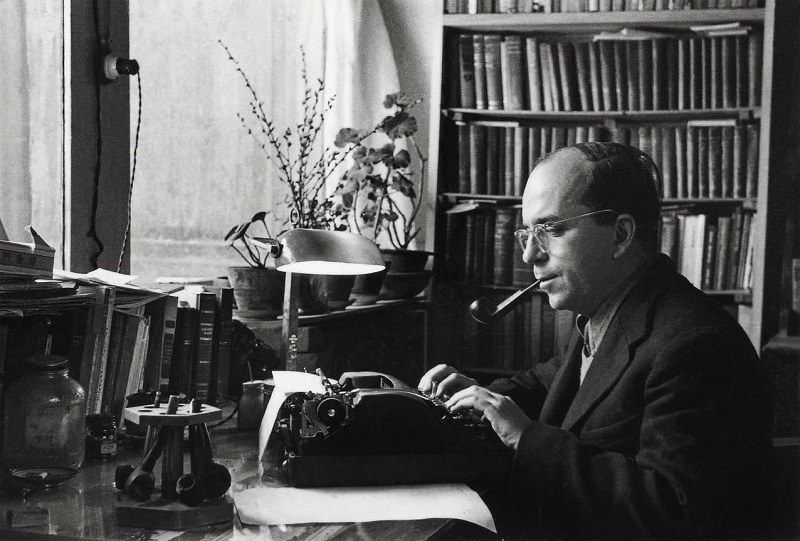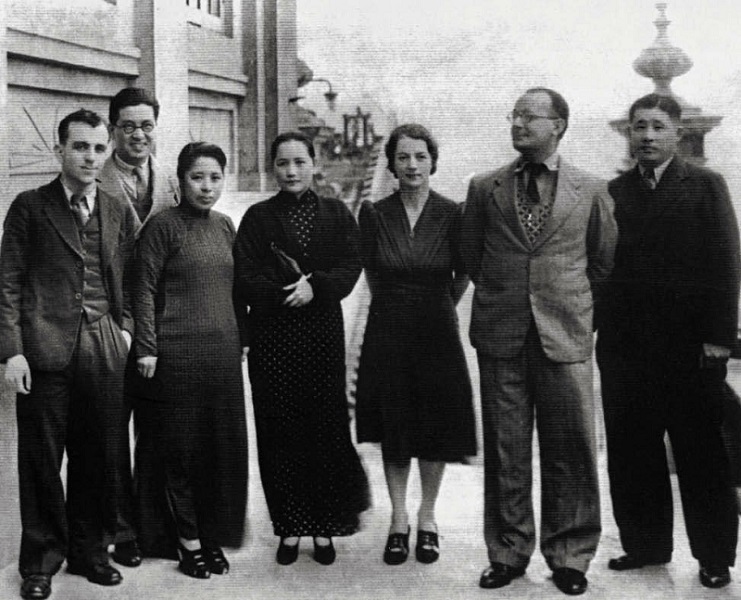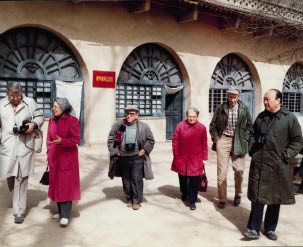Israel Epstein (1915-2005) was born in Poland and spent most of his life in China. In his decades-long career as a journalist and author, he witnessed the Chinese revolution and the founding and rise of the People’s Republic of China.

Epstein in the early years of China Reconstructs (now China Today).
Born in Poland, Raised in China
Israel Epstein was born in 1915 in Warsaw to a Jewish family. His parents were members of a Jewish organization against the Russian Czar, which was part of the Russian Social Democratic Labor Party, a Marxist party. The socialist and Marxist views of his parents had a profound influence on young Epstein.
At the age of two, Epstein moved with his family to Harbin, a city in Northeast China, and then to Tianjin, a city 140 km from Beijing, three years later. They lived in a foreign concession there, and the boy attended schools run by British and American residents. Fluent in Russian (taught by his mother), young Epstein read books of celebrated Russian thinkers and writers, which exposed him to sophisticated thinking and prepared him for a later career in writing.
From a very young age, he had witnessed foreign powers occupying Chinese territory and inflicting untold suffering on the Chinese people. When he was in the fourth grade, Kuomintang started the first cooperation with the Communist Party of China (CPC) under the policy of “alliance with Russia, cooperation with the Communist Party, and assistance to peasants and workers,” a move the Epsteins thought was just and necessary. However, few foreign families in Tianjin thought so at the time.
In 1931, 16-year-old Epstein became a reporter with the Beijing-Tianjin Times. During the same year, Japan invaded Northeast China. Shocked and indignant, Epstein reported on Chinese people’s courageous resistance to Japanese invaders, informing the rest of the world of developments in the Chinese theater of the world’s anti-Fascist war. In 1937 and 1938, Epstein, serving as a correspondent for the United Press, commuted between the battlefield and the rear of the war, recording major events of the time, including the Lugouqiao Incident, the Tianjin battle, victory of the Tai’erzhuang battle, and the fall of Guangzhou, in addition to the military and political affairs in Nanjing and Wuhan.

A group picture of Israel Epstein (first left) and Soong Ching Ling (fourth left) with other members of China Defense League in Hong Kong in 1938.
Going to Yan’an
When recalling his experiences in the 1930s and 1940s, Epstein said that his coverage of the Chinese People’s War of Resistance against Japanese Aggression enabled him to break free from the West-centric education he received as a child, and inspired him to view the known and unknown in the historical context.
When doing interviews in Guangzhou, Epstein met the woman who changed his life, Soong Ching Ling (Mme. Sun Yat-sen). At Soong’s invitation, he joined the English-language Newsletter published by the China Defense League she established in Hong Kong. While working at the journal, he translated CPC documents into English and published them in the Newsletter. It was during this period that he translated On Protracted War by Mao Zedong and introduced the book to the rest of the world.
In 1939, Epstein published his first book The People’s War in London, based on his first-hand observations and reports. It told the world of the Chinese people’s heroic resistance against Japanese invaders and firm confidence in winning the war. Soong thought highly of it, saying that it was different from other books about the war by foreign writers, as it combined first-hand reporting with a review of the past and forecast of the future.
In the summer of 1944, Epstein broke through the Kuomintang blockade and headed for the revolutionary base Yan’an, to see what was really happening there. In his cave residence, Mao had a two-hour conversation with him, during which Epstein was deeply impressed by the CPC leader’s ability to express complex strategic ideas in a simple yet unforgettable manner. The visit to Yan’an gave Epstein a better understanding of the CPC. He decided to write a book about what he saw and heard during the trip and publish it globally. To work on it, he and his wife Elsie Fairfax-Cholmeley had to leave China for the U.S.
Before leaving the country, Epstein had a talk with Zhou Enlai, which left a lasting influence on him. “Borne out by what did happen between 1944 and 1949, it helped us, and our audiences abroad, to see the main trend in the intervening complex of events, culminating in the birth and growth of a China no longer, as for a century past, a football in the world arena but one of its leading players,” Epstein recalled later.
His book The Unfinished Revolution in China was published in 1947 in the U.S. It introduced the CPC and the Chinese revolution to more people around the world, and announced the upcoming creation of a new republic. It brought more international attention to China.

Epstein and some American journalists revisit Yan’an in March 1985.
After the Founding of the People’s Republic
In the summer of 1951, Epstein and his wife returned to China at the invitation of Soong, and become dedicated to the cause of introducing the new China to the international community. At first Epstein worked as a consultant for the People’s Republic’s first English-language bi-weekly, People’s China. In 1952 he joined the English-language magazine China Reconstructs (now China Today) founded by Soong, and worked there in various positions including editor-in-chief for the following 50-plus years. During these years he dedicated himself to the mission of reporting China’s reality to the rest of the world, helping Western readers gain a correct understanding of the country. With a historical and international vision, Epstein wrote a large volume of articles about people from all walks of life and development in various sectors of the Chinese society.
He also participated in the translation of many important documents and books including Selected Works of Mao Zedong and Selected Works of Deng Xiaoping, and became a key figure in China’s international publication sector of the time.
Epstein became a Chinese citizen in 1957 and a member of the CPC in 1964. He also served as a standing committee member of the sixth to 10th National Committee of the Chinese People’s Political Consultative Conference (CPPCC).
Epstein felt a deep bond with China and the Chinese people. He called China home as he had numerous friends and a career in the country. He said he had watched the Chinese people emerge victorious in their revolution and would join them in building the new China.
The media is a recorder of history. As a journalist, Epstein observed what was happening in front of his eyes from a historical perspective, and gave insightful analysis. He conducted extensive research for every article and book he wrote. When working on Soong Ching Ling’s biography, he spent 10 years to study relevant records and conduct interviews at home and abroad, exploring her presence in the major domestic and international events of her time and the multiple dimensions of her extraordinary character. When writing Tibet Transformed, he made four trips to Tibet, 10 years apart. In the 1976 visit alone he interviewed 700-800 people of various backgrounds all over the region, including many far-flung corners, and took 3,000 pages of notes. It took him 30 years to complete the 200,000-word book on Tibet.
Israel Epstein is remembered by people who know him as an amicable man of great knowledge and a good sense of humor, who was skilled at telling stories about China in a way appealing to international readers. He is also remembered for his deep love for China and Chinese people, a love that he said bonds his work and life with the destiny of the country.